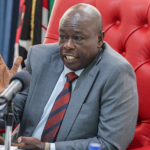The National Treasury is set to amend the Tax Act to reduce Value Added Tax (VAT) and other taxes as part of new measures to raise revenue for President William Ruto’s administration. Treasury Cabinet Secretary John Mbadi announced yesterday that the VAT rate will be decreased from 16% to 14% in the medium-term budget. Additionally, corporate tax and other taxes will also be adjusted, though specific details were not provided.
The tax changes are anticipated to benefit manufacturers and investors, as the corporate tax rate is currently 30% for domestic companies and 37.5% for non-resident companies. The reduction in VAT is expected to lower the prices of goods and services, thereby reducing the cost of living and increasing consumer savings.
Under the law, the National Treasury Cabinet Secretary has the authority to adjust the VAT rate by up to 25% either upwards or downwards. VAT is a consumption tax that ultimately affects the final consumer and is calculated as a percentage of the price, thus taxing personal spending rather than business operations.
During the launch of the FY 2025/26 Budget Preparation Process, Mbadi stated that the government would not support additional expenditures but would focus on enhancing efficiency, accountability, and the prudent use of existing resources. He also revealed plans to implement a new financial management system aimed at increasing transparency in procurement processes.
“Agriculture will be prioritized to support manufacturing and economic growth, with a focus on SMEs and housing. Despite fiscal constraints, the government will work to ensure growth and broaden opportunities,” Mbadi said. He added that the government’s fourth medium-term plan will concentrate on transforming the Agricultural Sector, Micro, Small and Medium Enterprise (MSME) Economy, Housing and Settlement, Healthcare, and the Digital Superhighway.
It is not the first time the government has reduced VAT to address the high cost of living. In 2020, former President Uhuru Kenyatta lowered VAT from 16% to 14% to mitigate the effects of COVID-19. Although a reduction in VAT decreases the retail price of goods and services, the price drop is not always directly proportional to the VAT reduction.
A lower VAT rate can slightly boost the consumption of affected goods, but it also reduces government revenue. As a result, consumer demand for items with lower taxes often increases.
Treasury Cabinet Secretary John Mbadi noted that the implementation of the current budget has begun, and proposals will soon be submitted to Parliament for consideration. “However, it is important to note that following the withdrawal of the 2024 Finance Bill, the Government has had to forego additional revenue measures. We therefore implemented measures aimed at aligning our priorities with the available resources,” Mbadi said.
Last week, Mbadi informed accounting officers that the National Treasury forecasts a budget deficit of Sh767 billion for the year ending June 2025. “The government is operating under a constrained fiscal environment; we are barely managing the 2024-2025 budget,” Mbadi added.
Treasury Principal Secretary Chris Kiptoo emphasized the importance of adhering to the Budget Review and Outlook Paper (BROP), sector budgets, and revenue bills, including reviewing county allocations. He highlighted the need for a zero-based budgeting approach, proper budget costing tools, and announced that budget review meetings would be held to ensure compliance.
Following the rejection of the Finance Bill 2023, President William Ruto indicated that the country would need to borrow more to sustain government operations. He explained that dropping the bill had set Kenya back two years, complicating efforts to raise additional taxes amid a substantial debt burden. “This means Kenya will have to borrow one trillion shillings just to enable the government to run its operations,” Ruto said.
President William Ruto also mentioned he is contemplating reducing government spending, including cuts in his own office, as well as lowering allocations to the judiciary and county governments. The additional taxes were intended to generate about Sh350 billion, while approximately Sh600 billion was expected to be borrowed.
Ruto noted that the proposed tax measures were part of efforts to address the country’s debt burden of over Sh10.3 billion. “I have been working very hard to pull Kenya out of a debt trap… It is easy for us, as a country, to say: ‘Let us reject the finance bill.’ That is fine. And I have graciously said we will drop the finance bill, but it will have huge consequences,” Ruto stated at a press conference.
He warned that rejecting the budget would impact the employment of 46,000 junior secondary school teachers on temporary contracts and could affect healthcare services. Additionally, Ruto indicated that the government would struggle to support dairy, sugarcane, and coffee farmers, including paying off debts owed by their factories and cooperative societies as planned.
However, Ruto said he is considering addressing concerns raised by opponents of the finance bill by cutting spending in his office and potentially eliminating budgets for the First Lady and the deputy president’s spouse.



